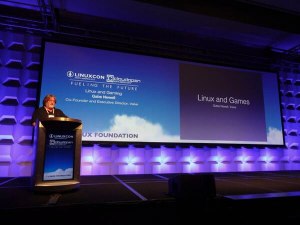Technology has entered a new era in which software is no longer a differentiator, but the foundation that the “big winners” are building their services on, Jim Zemlin said today in his annual State of Linux speech at LinuxCon and CloudOpen North America in New Olreans.
 Companies like Google, Facebook, and Twitter are built on free and open source software and this pattern is defining success in computing. Big shifts in the tech landscape toward cloud computing and a web-centric application model are also favoring Linux and open source.
Companies like Google, Facebook, and Twitter are built on free and open source software and this pattern is defining success in computing. Big shifts in the tech landscape toward cloud computing and a web-centric application model are also favoring Linux and open source.
“Linux is the default model for new areas of innovation,” Zemlin said.
As cloud and web-scale computing take over, Linux is leading this change and replacing Unix as the de facto operating system for servers. He predicts that Linux and open source will continue to dominate as functionality is abstracted to service layers and hardware support becomes more important.
“Every IT trend is being developed on top of free and open source software,” he said. “I can throw a dart and it hits a company being created on free and open source.”
Twitter, which last week announced it plans for an IPO, has open source software at its core and hires 10-15 percent of its engineering staff from people who work on Twitter-related open source projects, Zemlin said.
The Future of Gaming is Linux
Valve, the gaming company that in February released its Steam web platform for Linux, also builds and runs all of its source code, animation and assets on Linux — a typical setup for companies in the gaming industry, said Gabe Newell, co-founder and executive director of Valve in his keynote that followed and reinforced the message in Zemlin’s talk.
The same trends shaping the tech industry overall are shaping the gaming industry — driving innovation and changing the business model, Newell said.
The center of gravity has shifted from console hardware platforms with price and access controlled by PC makers, to web-based free-to-play and massive multiplayer online games. As a result, businesses are investing in developers and services and users are the focus of market development strategies, Newell said.
The realization that this was the new business model, led Valve to change its approach to game development.
“Valve became convinced that Linux is the future of gaming,” Newell said.
So they began working hard to make sure Linux is a good solution for gamers and game developers, he said. They started by porting one game to Linux and the lessons they learned in that process applied to many of the games that followed. They now have 198 games running on Linux and have developers working on contributions to other open source projects.
The next step is solving the fragmentation problem between the various platforms in the mobile, living room and desktop spaces. They’re aiming for a “grand unification” and have plans to announce their vision for a hardware solution next week.
See the full coverage of their remarks in Linux.com’s live blog from LinuxCon and CloudOpen. And watch this afternoon’s keynotes live on streaming video.


